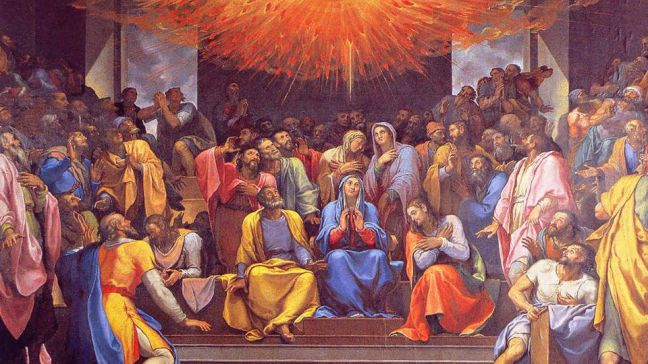Pentecost - Sunday 31st May 2020
After Easter Day, today is the second greatest festival in the Christian Church. The name Whitsunday is believed to derive from the white robes worn by those who were baptized on that day. The other name Pentecost is taken from the Greek meaning ‘the fiftieth day’. The fiftieth day after Easter Day, and the day on which the Season of Easter ends.
This day is also the Jewish Feast of Weeks, fifty days after Passover. A feast at which the first fruits of the corn harvest were presented, and in more recent times the giving of the Law by Moses commemorated.
Mainstream Christians commemorate and celebrate the descent of the Holy Spirit on the Apostles, in fulfilment of Jesus’ promise before he ascended to heaven that he would not leave them desolate. The events are recorded in the second chapter of the Acts of the Apostles, and we read of how the Holy Spirit enabled the Apostles to speak of the mighty works of God in different tongues or languages.
The honesty of the account brings a smile to my face when I read that some of the bystanders thought that the Apostles were drunk! Perhaps some thought this because they didn’t understand the languages they were speaking or because some of them were indeed speaking in tongues, as opposed to any particular language. Either way it is a nice human touch to what is otherwise an incredible event.
It’s striking that what the Holy Spirit first enabled the Apostles to do is to explain the Good News that Jesus is the Messiah, foretold in the Old Testament, to the Jews in Jerusalem from every corner of the known habitable globe in their own language, their own mother tongue. We tend to think of this as being a product of the Renaissance and Reformation when so much emphasis was rightly placed on translating the Bible in to as many languages as possible. As an aside it is a shame that we will not have the opportunity to fully commemorate the four hundredth anniversary of the publication of the 1620 Welsh Bible which remained in common usage until 1988.
It does make a huge difference to read or hear something either in our own language or a language in which we are fairly fluent. I’m sure that many of us will have had the experience of visiting another country and getting a bit of a surprise when the food ordered appears at the table - and is not quite what we were expecting! That’s something relatively simple, but to be able to understand something more complicated, let alone something beyond human comprehension, is all the more important.
Listening alone is not enough. Looking alone is not enough. We have to hear and see before we are able to begin to understand. There are aspects of Freemasonry which are difficult to understand, words used which are alien and impenetrable. But unless we understand what those words mean we have no hope of understanding the concepts promoted. We have to have a basic understanding, a good and solid foundation, before we are able to advance and progress, to grow in knowledge and understanding.
As St Peter explains to the Jews that the Apostles were not drunk on alcohol but rather drunk on the Holy Spirit, he refers back to the prophecy in the Book of Joel:
“And it
shall come to pass afterward,
that I will pour out my spirit on all flesh;
your sons and your daughters shall prophesy,
your old men shall dream dreams,
and your young men shall see visions.
Even upon the menservants and maidservants
in those days, I will pour out my spirit."
“And I will give portents in the heavens and on the earth, blood and fire and columns of smoke. The sun shall be turned to darkness, and the moon to blood, before the great and terrible day of the Lord comes. And it shall come to pass that all who call upon the name of the Lord shall be delivered; for in Mount Zion and in Jerusalem there shall be those who escape, as the Lord has said, and among the survivors shall be those whom the Lord calls.”
The majority of Christians believe that it is God the Holy Spirit, the Third Person of the Trinity, which enables us to hear and see, and begin to understand the great mystery of faith. The Holy Spirit is the fulfilment of Jesus’ promise to his Apostles not to leave them desolate. A promise which he extends to us through the waters of Baptism, the first point of reception of the Holy Spirit. It is thus that God resides in each and every one, and so we are never on our own, and enabled to achieve things that of our own we have no hope whatsoever – with or without the aid of alcohol!
The Season of Easter therefore ends with a climax second only to Easter Day itself. As we celebrate the victory over death, we also celebrate God’s presence in and with us in the Person of the Holy Spirit. With that foundation, would that we may look and see, listen and hear that we may believe, that we may progress in the way of perfection, guided and aided by the constant presence of God to achieve wonderful things, both great and small.
I offer this prayer:
Strengthen us, we beseech thee, O Lord, with the Holy Spirit, the Comforter, and daily increase in us thy manifold gifts of grace; the spirit of wisdom and understanding; the spirit of counsel and strength; the spirit of knowledge and true godliness; and fill us, O Lord with the spirit of thy holy fear, now and forever.

